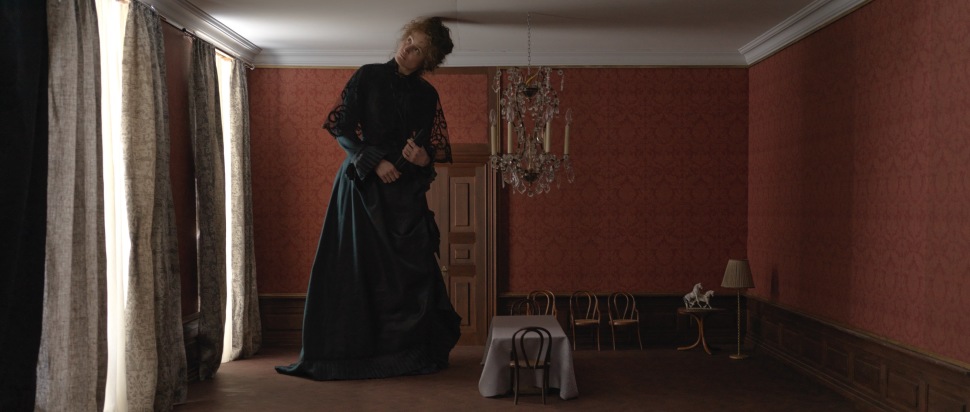Corsage
Vicky Krieps is endlessly watchable as Empress Elisabeth of Austria, pushing back against the constraints of royal life, in Marie Kreutzer's innovative Corsage
There is a moment very early in Marie Kreutzer’s puckish new period piece Corsage that effortlessly paves the way for what follows. It comes directly after the Empress Elisabeth of Austria (a phenomenal Vicky Krieps) affects a faint to skip out on an official state engagement with her husband, Emperor Franz Joseph (Florian Teichtmeister). When her carriage returns to the palace, she ascends the stairs in a sequence that crackles with non-conformity. Perhaps it’s the trendy hairstyles of her ladies in waiting. Perhaps it’s the incursion of moody modern music in the form of Camille’s She Was.
Perhaps it’s the magnetic insouciance of her walk, which makes the use of slow-motion feel less like the stuffy shuffling of historical drama and more like the swagger of an action movie. Perhaps it was that knowing look to the camera as she passed? None of this knocks proceedings out of kilter, but the effect suggests the blooming of a gloriously revisionist portrait.
It’s as if Kreutzer’s desire was not only to present a woman straining against the strictures of an unforgiving 19th-century patriarchy, but to weave that same teeming insurrection into the film’s fabric. While the trappings of stately costume drama are present and correct – from locations to outfits to dialogue – they’re shot through with contrapuntal details, interpretations, and aesthetic choices. Perhaps most notable is the slow disintegration of hermetically sealed historicism which is represented by incidental anachronisms. They come in the form of errant props from the future – a motorised tractor, a plastic mop and bucket, an electric tattoo gun, a heroin habit, a modern ocean liner. By the time that last one appears, historical accuracy has largely been left in the film’s wake.
Instead, this is a portrait of Elisabeth – or ‘Sisi’ to friends and fans – that re-imagines her as a complicated, modern woman navigating an antiquated realm. She is a figure limitingly concocted by her people and the historical record, not to mention the industries that have traded in her subsequent iconography. Corsage, as a result, feels like a peek behind the curtain, even if the exposed ‘reality’ is invention.
The action is joined in 1877, shortly before Sisi’s 40th birthday, and portrays her daily travails. She bristles at the way she is discussed by loose-lipped subjects and side-lined by her husband; but she also spends her time travelling Europe, far from court, and obsessing over her self-image as she squeezes into the painfully tight bodice that maintains her youthful elegance.
In other similar films, her dalliances with men – such as Colin Morgan’s besotted riding instructor – might become defining, but not here. Krieps infuses Sisi with contradictions and a sense both of a fragile susceptibility and wilful self-determination. She becomes the film’s ultimate anachronism and whether she’s nonchalantly smoking a cigarette, sticking her finger up to the Austrian establishment, or berating an underling for not tying her corset tight enough, you could watch Krieps’ charismatic turn all day. As a result, Corsage reflects its protagonist, a refined period ornament injected with a riotous, rebellious energy.
Corsage is released on 26 Dec by Picturehouse; scroll on to read our interview with director Marie Kreutzer
